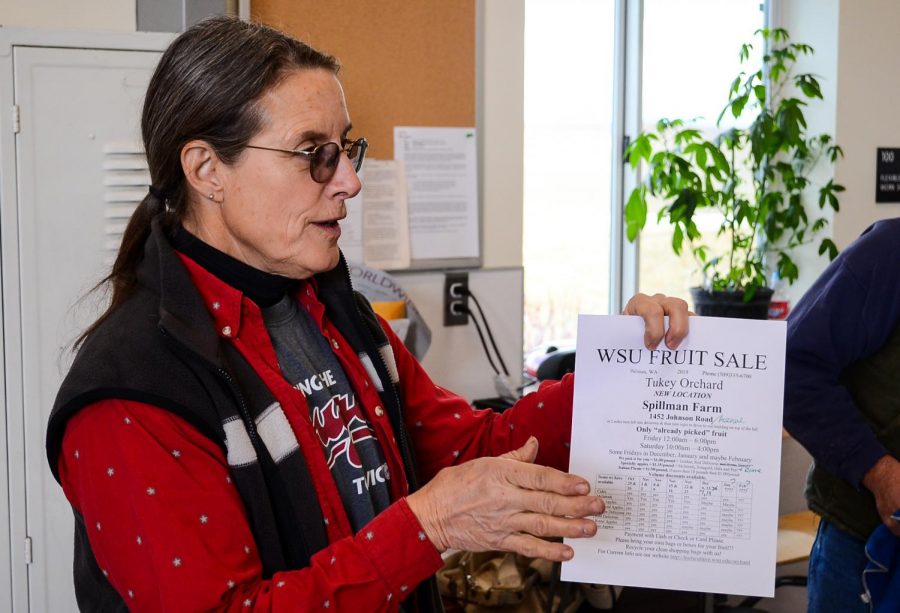Fewer orchards; lesser options
Regulations on apples, labor costs drive small farmers out of apple business
Deb Pehrson, farm manager at the R.B. Tukey Horticulture Orchard, says there are not many apple orchards in the Palouse, which means there is not much growing competition Saturday at Spillman Farm Orchard.
November 19, 2019
A recent decrease of midsize apple orchards across Washington can lead to fewer buying options for consumers including locally sourced foods.
Todd Fryhover, president of the Washington Apple Commission, said that 15 years ago there were about 4,500 independent apple growers in Washington, whereas today there are only 1,260.
“Small growers don’t have the same ability to meet the growing demands of [food] regulation,” he said.
Fryhover said expenses such as labor costs, food and safety issues and the ability to participate in the H2A program, which allows U.S. employers to bring foreign workers to the U.S. for temporary agricultural jobs, put smaller growers at a disadvantage.
Tim Kovis, communications manager for the Washington State Tree Fruit Association, said apple growing is popular in Washington due to the ideal growing conditions the state provides.
He said in the northwest there is no humidity, which is ideal in preventing mildew from growing on apples. He said apples do well on hot days and cool nights which Washington offers. Washington also does not have the same pests and disease pressures that other parts of the country face, he said.
Desmond O’Rourke, former WSU professor and tree fruit analyst, said several factors can contribute to the decrease in midsize farms in the Washington apple industry. He said one factor is the economy of scale. O’Rourke said this scale is when larger firms tend to have an advantage when it comes to costs of growth compared to smaller firms.
He said over the years orchards have become more productive and larger. O’Rourke said in the past most growers would have 300 trees per acre. Now, many of them have 2,000 trees per acre. This tends to lower prices of apples in the industry, he said.
“The average return in an apple orchard per acre is about $14,000,” he said.
Deb Pehrson farm manager at the R.B. Tukey Horticulture Orchard, said she sells already picked apples on Spillman Farm Fridays and Saturdays. She said you can find a variety of apples for sale on the farm including McIntosh, Gala and Golden Delicious.
Pehrson said smaller growers usually sell to locals as opposed to larger growers that can sell directly to bigger companies. She said in the Palouse there aren’t many apple orchards, so there is not much growing competition. In popular apple growing areas, however, it could be harder to compete with larger orchards with the means to produce product faster, Pehrson said.
She said that consumers who prefer to buy locally grown products from smaller growers might have that option taken away if larger growers continue to dominate the industry. Pehrson said the demand to compete with the prices of apples from major food retailers may force smaller growers out of the industry.
“It becomes hard for smaller growers to constantly keep up with larger growers, especially when you have older equipment to work with and less labor help,” she said.
She said prices range anywhere from $1-$1.50 a pound on the Spillman farm depending on what type of apples people choose. She said some of the most popular dishes she finds that customers make with her apples are cider, apple sauce, and pies.
O’Rourke said another factor to consider is the advancement of new technology in agriculture. He said that a smaller grower often does not have the capital to borrow from a bank to introduce new technology on their orchards. He said this costly technology can be beneficial for faster and more efficient production.
O’Rourke said the last issue that affects small growers is the tremendous amount of regulations on their products. He said the most recent regulation has been the Food Safety Modernization Act which aims to regulate how foods are grown and processed.
“If you have 500 acres of apples you can afford to pay someone full time to make sure you’re meeting all of the regulations, compared to someone else with only 50 acres,” O’Rourke said.
He said regulations have been one of the big factors driving small farmers out of business because they simply cannot keep up with them.
O’Rourke said the future for small growers in the apple industry is uncertain. He said the apple industry has become very concentrated and to service dominant food industry retailers such as Walmart and Kroger you must have a big organization.
He said unless a grower can manage to expand in the commercial industry, it will be hard for them to survive.








